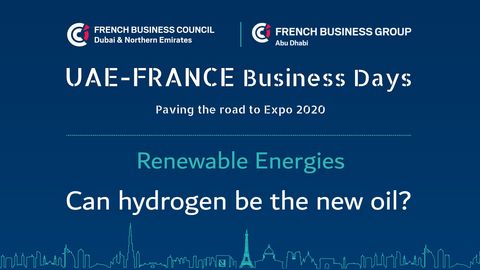Energies renouvelables - Développement durable - Environnement
[Replay] Can Hydrogen be the new oil?

Speakers
- Ronnie Chalmers, Vice President Africa Middle East & India - AIR LIQUIDE
- Christophe Comte, Sr. VP Business Development - ENGIE Group
- Dr Faye Al Hersh - Technology Specialist, Strategy and Corporate Development - Masdar
- Richard Power, Partner Clyde & Co LLP
Key Takeaways
On March 21st the UAE cabinet gave the go ahead for a nationwide system of Hydrogen vehicles and it's been announced that the UAE is going to ramp up production of Hydrogen.
A recent study predicted that globally the Hydrogen industry is expected to grow to be worth 183 billion dollars per year by 2023 increasing to 2.5 trillion dollars by 2050.
Hydrogen seems to be the answer to the world's push for net zero, it's a source of energy which emits mostly water vapor when it's burned, it can be used to transport energy and it can be used to store energy. Hydrogen can replace lots of energies in today's ecosystems, it can be used as a fuel, as a feedstock. It can be used in heavy duty mobility (Aviation, Marine and heavy road transportation) as a fuel or as part of the electrical vehicle battery systems. And it can be used for production of synthetic methane and injection of this synthetic methane into the gas network.
Green Hydrogen is produced using renewable power sources and blue Hydrogen is produced using natural gas and carbon capture and storage. Both can be produced with no greenhouse gas emissions so it is expected to play a critical role to achieve efficient decarbonization.
Air Liquide committed to reduce their co2 emissions in absolute terms by one-third by 2035 and Hydrogen and the production of Hydrogen will be a big part of that. Its ambition is to have three times as much Hydrogen being sold by 2035 by producing both blue and green Hydrogen.
Engie is looking at Hydrogen projects with potential to be expanded in a modular manner and looking at locations where they can have multi-purpose use of this Hydrogen to drive economies of scale and exports which can be very relevant for the UAE and this region.
Masdar announced plans to develop a demonstration plant in Masdar city with strategic partners to explore the development of green Hydrogen and sustainable fuel production to be used for the transport sector. They also launched the establishment of the Abu Dhabi Hydrogen alliance between Mubadala Investment Company, ADNOC and ADG with the aim to position Abu Dhabi and the UAE as a trusted and secure supplier of low carbon Hydrogen to emerging international markets as well as build up the green Hydrogen economy here in the UAE.
There is now a global momentum to decarbonize driven by the introduction of policies and regulations around the world, for example in Europe where only half of the anticipated demand for Hydrogen can come from domestic supply, the rest would need to be imported. The UAE is uniquely positioned to produce green Hydrogen due to the low cost of the solar resources, abundant space and it can capitalize on its existing infrastructure so this is a great opportunity for them to potentially export this Hydrogen in the form of synthetic fuel, blue ammonia or directly exporting Hydrogen.
Aviation and Shipping sectors are currently bound by international regulations to decarbonize which are expected to only get more stringent going forward therefore these sectors will likely be the main demand sources for decarbonized Hydrogen. Airplanes of the future will have a transition period with the use of hybrid fuel solutions rather than only one source of propulsion so using Hydrogen as part of the of the solution in a hybrid model.
The main challenge to create a proper market and demand for Hydrogen is to make it commercially viable. The current price differential between gray Hydrogen and green Hydrogen is one to three so one key objective is to drive green Hydrogen prices down:
Through strong collaboration between private and public sectors
Through focus on technology and technological improvements
Through more support in the form of a framework of strategy or regulatory and monetary supports in the form of subsidies and funds and target and compliance mechanisms with decarbonization targets and blending mandates so all of this would lead to an increase in demand which will attract investments from the public and the private sector and bring economies of scale
There will be a market for both Blue and Green Hydrogen. Blue Hydrogen will play a very important role in the transition period as it will be more economical in the initial stages. But very soon the cost of Green Hydrogen will be comparable to that of Blue Hydrogen (mainly due to the fact that the UAE has achieved one of the lowest price of electricity in the world and that represents more than 60% of the cost of producing that green Hydrogen) and will therefore be high




